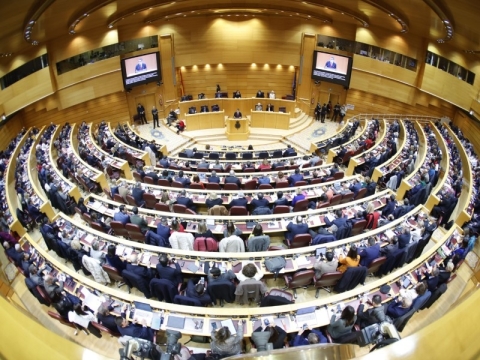Politics
Amendments to the Amnesty Law rejected in the Spanish Parliament
Approved by the Spanish Government
USPA NEWS -
The Plenary Session of the Congress of Deputies - the Lower House of the Spanish Parliament - rejected this Wednesday the entire amendments presented by the VOX - far-right - and Popular - center-right - Parliamentary Groups to the Proposal for the Organic Law of Amnesty for institutional, political and social normalization in Catalonia. Having overcome this debate, the Bill presented by the Socialist Group continues its processing.
The alternative text of the far-right group VOX was rejected by 33 votes in favor and 309 against. The one presented by the Popular Group, which was submitted to a public vote by call, was also rejected after receiving 171 votes in favor and 178 against. The purpose of the Proposal for an Organic Amnesty Law, whose consideration was approved in the Plenary Session on December 12 and continues with its parliamentary processing, is "to provide an adequate response more than ten years after the beginning of the independence process, when the most acute moments of the crisis have been overcome and it is time to establish the foundations to guarantee coexistence for the future," according to the proponent group's argument in the statement of reasons.
In this way, the proposition indicates that the amnesty "is configured in the system as an appropriate means to address exceptional political circumstances" and pursues "a general interest, such as the need to overcome and channel deep-rooted political and social conflicts, in the search for the improvement of coexistence and social cohesion, as well as an integration of various political sensitivities."
The text, from the Socialist Group, is structured in 16 articles - grouped into three titles -, two additional provisions and a final provision. Its Title I includes the objective scope, which consists of amnesty the "acts determining criminal, administrative or accounting liability, executed within the framework of the consultations held in Catalonia on November 9, 2014, and October 1, 2017, of its preparation or its consequences, provided that they were carried out between January 1, 2012, and November 13, 2013". Other actions, developed in the same article, are also amnestied "that were committed between the mentioned dates, even if they are not directly related to these consultations or even were carried out after their respective celebration."
Alternative texts
The first amendment in its entirety to be debated and voted on during the plenary session this Wednesday, in order of presentation, was that of VOX, which stated in its alternative text that "the constitutional order must be provided with means that, with all firmness, ensure the subsistence of the social and moral basis that serves as its foundation". The text "proposes that the Penal Code provide, with the express nature required by criminal legislation, the action of negotiating with persons judicially convicted, or prosecuted or removed from the action of Justice for any of the crimes sanctioned in the Penal Code." In addition, it includes "limits to the activity of political parties, respect for the unity and sovereignty of Spain, as well as not attacking its territorial integrity. Parties that transgress these limits must be considered illegal and subject to dissolution."
The Popular Group justifies its amendment in that the Proposition "constitutes an amendment to the entire Judicial Branch, becoming the spearhead of the continuous threat to the independence of said Branch." The text proposed to modify Organic Law 10/1995 of the Penal Code, creating a new chapter under the heading "Constitutional Disloyalty," which would punish "with prison sentences of five to ten years and absolute disqualification for a period of six to twelve years." authority or public official" that "declares the independence of a part of the national territory or its integration into another State, or carries out acts aimed at making said declaration." The proponent includes that when "a legal entity is responsible for any of the crimes established in this Chapter, the penalty of dissolution will be imposed."
Having passed the entire debate, the text returns to the Justice Commission, which "will appoint one or more rapporteurs from within it so that, in view of the text and the amendments presented to the articles, they draft a report within the period of fifteen days." Once the report of the presentation is concluded, the debate in the Commission will begin. As it is an organic law proposal, its approval requires an absolute majority of Congress, in a final vote on the entire project. If approved, the text will be sent to the Senate, and if, on the contrary, "it is not achieved, the project will be returned to the Commission, which must issue a new opinion within a month."
Liability for this article lies with the author, who also holds the copyright. Editorial content from USPA may be quoted on other websites as long as the quote comprises no more than 5% of the entire text, is marked as such and the source is named (via hyperlink).






